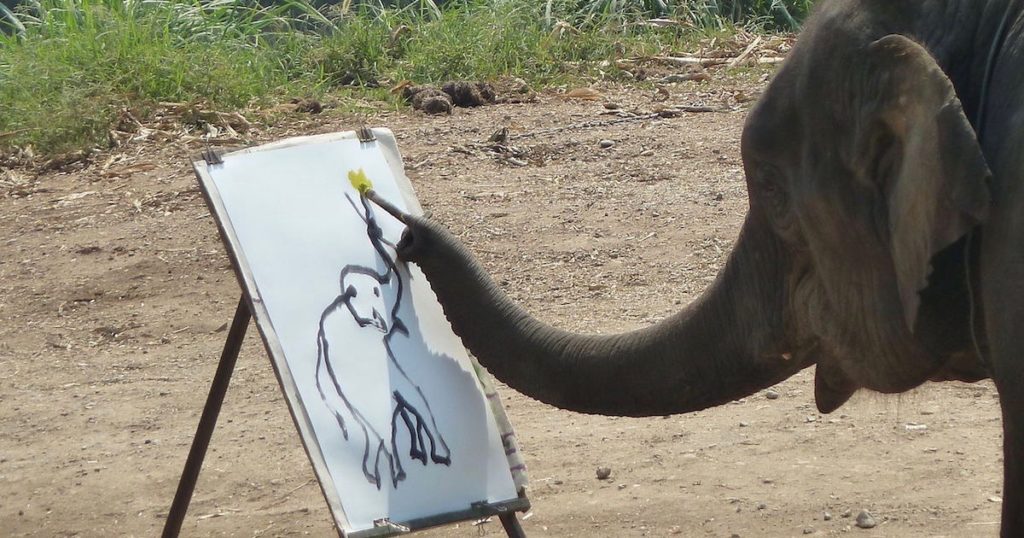 Culture & Ethics
Culture & Ethics
 Neuroscience & Mind
Neuroscience & Mind
Elephants Are Better “Persons” Than People!

I have warned about the lawsuit, now in New York’s highest court, that seeks to have judges declare Happy the elephant a “person” entitled to human-type rights. (The Nonhuman Rights Project first tried this same tack with chimps.)
Harvard history professor Jill Lepore, writing in The Atlantic, is all for it. Why, not only do elephants deserve rights, but they are better than people! From “The Elephant Who Could be a Person“:
Elephants, the largest land mammal, are among the most intelligent, long lived, and sentient of nonhuman animals, and, arguably, they’re the most sympathetic. As moral agents, elephants are better than humans. They’re not quite as clever, but, as a matter of social intelligence, they’re more clever than every other animal except apes and, possibly, bottlenose dolphins, and they’re more decent than humans. They live in families; they protect their young; they grieve their dead; they don’t eat other animals, and they don’t cage, isolate, and torture them. Elephants appear to possess a theory of mind: They seem to understand themselves as individuals, with thoughts that differ from the thoughts of other creatures. They suffer, and they understand suffering.
Good grief, they are herbivores. Of course they don’t eat other animals!
We, on the other hand are omnivores. It is not “wrong” for us to eat animals. But some of us choose not to consume natural and nutritious food out of a sense of moral duty. Name one elephant that would ever do that. You can’t, because only human beings have duties. And only we have a true moral sense. That is, only we are moral agents, and thus, only we should have rights.
Think About It This Way
Can an elephant can ever be guilty of a crime? Of course not. To commit a crime, one must have the capacity of intentionality and comprehend the difference between “right” and “wrong.” No elephant could ever do that. If an elephant killed a human being, it could not be found guilty of murder. Nor would it have done anything “wrong.” It would have just been acting like an elephant.
Yes, yes, I know. Corporations have rights and corporate personhood is worthy of debate. But corporations have rights because they are human associations. But corporations can also commit crimes, precisely because the humans that manage them do know right from wrong.
The case is as morally subversive as it gets. The points of the exercise are both to break the “species barrier” — the moral distinction that exists between people and animals — and destroy the principle of human exceptionalism.
I suspect that there will be at least one vote to declare elephant personhood. Associate Judge Eugene M. Fahey, one of the judges who will be deciding the case, has already authored a non-binding opinion in the above-referenced case, in which he opined that:
To treat a chimpanzee as if he or she had no right to liberty protected by habeas corpus is to regard the chimpanzee as entirely lacking independent worth, as a mere resource for human use, a thing the value of which consists exclusively in its usefulness to others.
If Judge Fahey thinks chimps deserve rights, he’s likely to believe that elephants do as well. That means the votes of only three more judges are needed to impose a new moral order on society, which would have known and unknown deleterious consequences and alter our relationship with animals forever.
Wrongheaded and Dangerous Misanthropy
This misanthropic drive among the elites to is not only wrongheaded, it is dangerous. Demolishing our self-perception as a uniquely valuable species would have very grave consequences. Human exceptionalism is both the philosophical underpinning for universal human rights and the basis of our self-imposed duties to each other, posterity, and the natural world.
It’s also nonsensical. If animal have rights, only we will have the duty to respect them. Animals would not be able to respect those of each other or us because that is beyond their comprehension. In this sense, giving animals rights is a way of imposing hyper-duties on us — which, when you think about it, proves human exceptionalism.
Advocates such as Lepore think that by elevating animals into persons — and rivers and nature too — we will come see ourselves as just another part of nature, which will induce us to tread more lightly on Pachamama. No. The natural world is tooth and claw. If we lower ourselves from the unique species to just another animal in the forest, that is precisely how we will act.
Cross-posted at The Corner.
